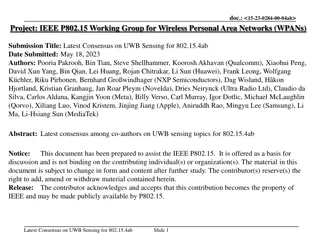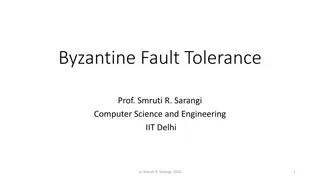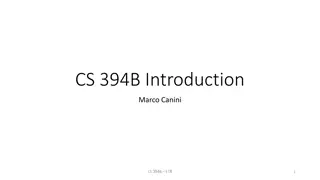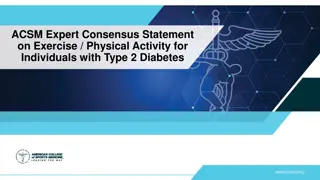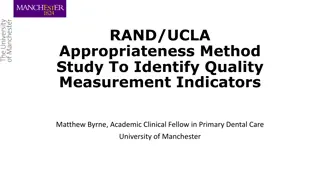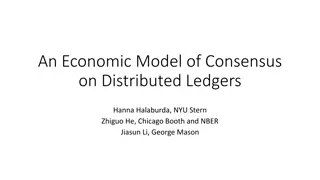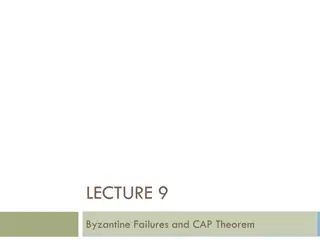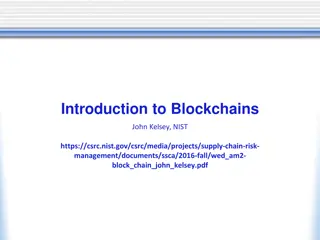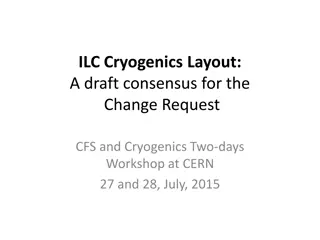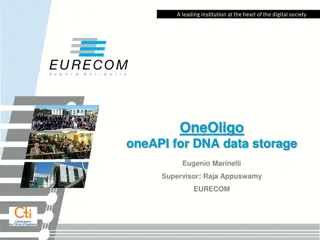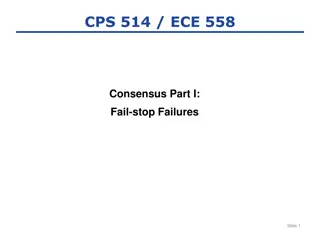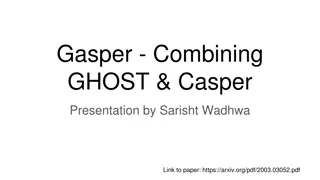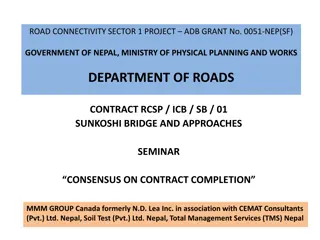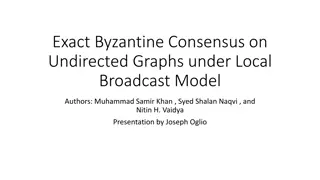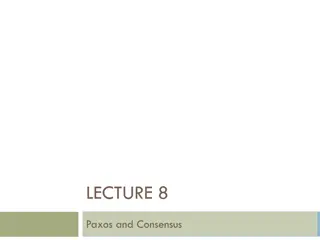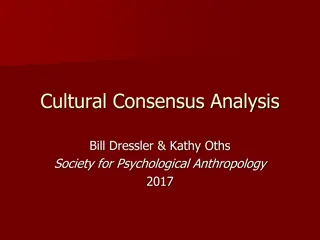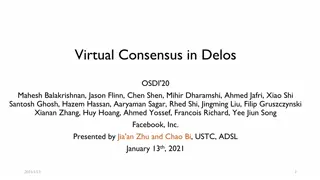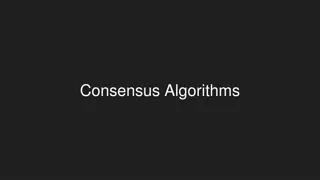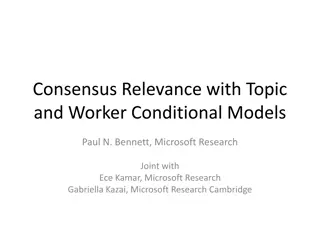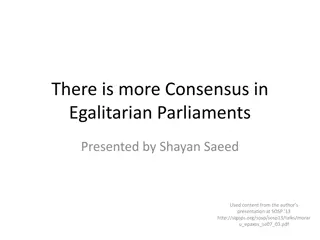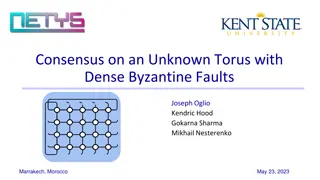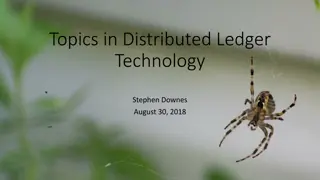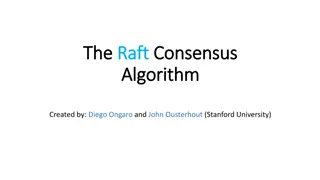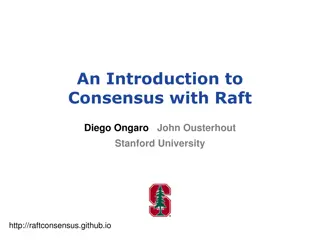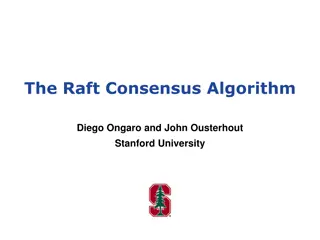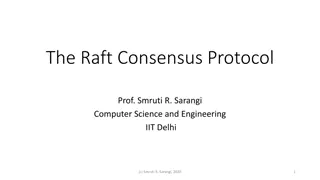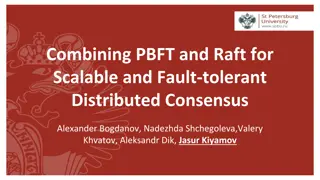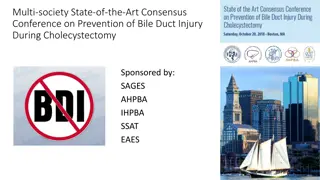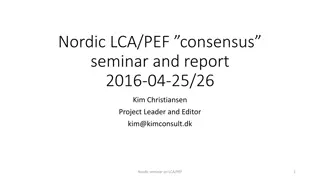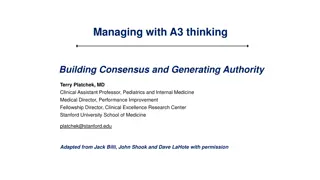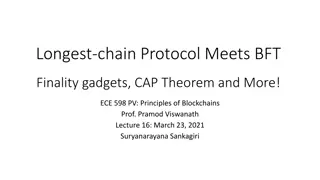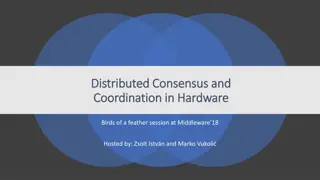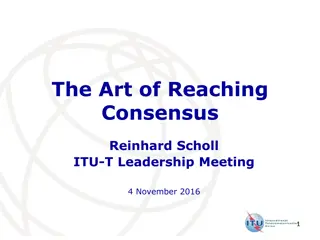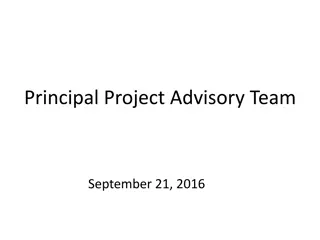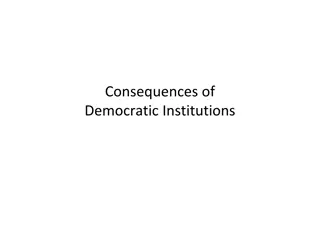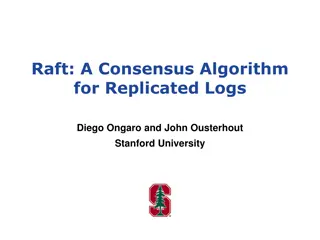Latest Consensus on UWB Sensing for 802.15.4ab
Co-authors from various companies present the latest agreement on ultra-wideband (UWB) sensing topics for the IEEE 802.15.4ab standard. The consensus includes definitions for sensing pulse shape, packet formats for bi/multi-static sensing, and support for specific sequences and patterns in UWB sensi
1 views • 27 slides
Understanding Byzantine Fault Tolerance in Distributed Systems
Byzantine fault tolerance is crucial in ensuring the reliability of distributed systems, especially in the presence of malicious nodes. This concept deals with normal faults, crash faults, and the challenging Byzantine faults, where nodes can exhibit deceptive behaviors. The Byzantine Generals Probl
0 views • 29 slides
Understanding CS 394B: Blockchain Systems and Distributed Consensus
This course, led by Assistant Professor Marco Canini, delves into the technical aspects of blockchain technologies, distributed consensus, and secure software engineering. Students will engage in flipped classroom-style classes and paper presentations, critiquing research papers, defending research
0 views • 65 slides
Expert Consensus Statement on Exercise for Type 2 Diabetes
This expert consensus statement provides an update on exercise recommendations for individuals with type 2 diabetes (T2D), emphasizing the benefits of physical activity in improving glycemic management, insulin sensitivity, cardiovascular health, and overall disease risk reduction. The document high
0 views • 16 slides
Study on Identifying Quality Measurement Indicators in Primary Dental Care
This study by Matthew Byrne, an Academic Clinical Fellow at the University of Manchester, focuses on identifying quality measurement indicators for primary dental care. The aims include gaining consensus on important quality dimensions, assessing available quality measures, and identifying areas for
1 views • 12 slides
Economic Models of Consensus on Distributed Ledgers in Blockchain Technology
This study delves into Byzantine Fault Tolerance (BFT) protocols in the realm of distributed ledgers, exploring the complexities of achieving consensus in trusted adversarial environments. The research examines the classic problem in computer science where distributed nodes communicate to reach agre
0 views • 34 slides
Byzantine Failures and CAP Theorem Overview
Byzantine failures refer to arbitrary patterns of failures where nodes exhibit inconsistent behavior. This lecture discusses Byzantine agreement and the challenges in reaching consensus with faulty nodes. It explores the minimum number of processes needed for consensus and extends the concepts to ge
1 views • 32 slides
Distributed Consensus Models in Blockchain Networks
Economic and technical aspects of Byzantine Fault Tolerance (BFT) protocols for achieving consensus in distributed ledger systems are explored. The discussion delves into the challenges of maintaining trust in adversarial environments and the strategies employed by non-Byzantine nodes to mitigate un
0 views • 34 slides
Raft Consensus Algorithm Overview for Replicated State Machines
Raft is a consensus algorithm designed for replicated state machines to ensure fault tolerance and reliable service in distributed systems. It provides leader election, log replication, safety mechanisms, and client interactions for maintaining consistency among servers. The approach simplifies oper
0 views • 32 slides
Understanding Blockchains: Solving Trust Issues in Distributed Systems
Blockchains, as explained by John Kelsey from NIST, are essential for achieving mutual agreement in distributed systems without complete trust among participants. The analogy of chess-by-mail illustrates the need for consensus on the state of the board, similar to how blockchains ensure agreement on
2 views • 34 slides
Proposed New Baseline Cryogenics Layout Consensus at CERN Workshop
The consensus at the CERN workshop led to a proposal for a new baseline cryogenics layout with major components on the surface. The cost balance is deemed neutral and requires further investigation before submission. Various comparisons highlight the advantages and potential cost savings of the prop
2 views • 7 slides
DNA Data Archival: Solving Read Consensus Using OneJoin Algorithm
DNA data storage presents challenges in archiving digital information efficiently due to the nature of biological media. This article delves into the complexities of DNA data storage, emphasizing the importance of robust archival solutions. The OneJoin algorithm offers a scalable and cross-architect
0 views • 8 slides
Raft Consensus Algorithm Overview
Raft is a consensus algorithm designed for fault-tolerant replication of logs in distributed systems. It ensures that multiple servers maintain identical states for fault tolerance in various services like file systems, databases, and key-value stores. Raft employs a leader-based approach where one
0 views • 34 slides
Exploring GASPER and LMD-GHOST in Blockchain Consensus Protocols
Delve into the world of blockchain consensus with GASPER and LMD-GHOST, two innovative approaches combining safety and liveness properties. Learn about GHOST, Casper FFG, and the progress made in achieving probabilistic safety and liveness in distributed systems.
0 views • 33 slides
Road Connectivity Sector Project Seminar on Contract Completion Consensus
Seminar held for Road Connectivity Sector Project in Nepal to achieve consensus on contract completion options and formulating action plans. Current contract status, non-negotiable conditions in value engineering, and seminar structure were discussed.
0 views • 27 slides
Exact Byzantine Consensus on Undirected Graphs: Local Broadcast Model
This research focuses on achieving exact Byzantine consensus on undirected graphs under the local broadcast model, where communication is synchronous with known underlying graphs. The model reduces the power of Byzantine nodes and imposes connectivity requirements. The algorithm involves flooding va
0 views • 7 slides
Understanding Paxos and Consensus in Distributed Systems
This lecture covers the concept of Paxos and achieving consensus in distributed systems. It discusses the availability of P/B-based RSM, RSM via consensus, the context for today's lecture, and desirable properties of solutions. The analogy of the US Senate passing laws is used to explain the need fo
0 views • 46 slides
Understanding Cultural Consensus Analysis in Psychological Anthropology
Explore the essence of Cultural Consensus Analysis (CCA) as a significant aspect of psychological anthropology. Through ethnographic work and structured techniques, CCA helps verify shared knowledge within cultural domains and enhance the comprehension of cultural models. The model and steps involve
0 views • 64 slides
Virtual Consensus in Delos - OSDI'20 Summary and Insights
Explore the presentation on virtual consensus in Delos from OSDI'20 by Facebook, Inc., diving into topics like motivation, background, design, evaluation, and conclusion. Discover insights on developing and deploying a new shared log efficiently without service downtime.
0 views • 53 slides
Understanding Consensus Algorithms in Paxos
Consensus algorithms play a vital role in distributed systems like Paxos. Paxos is a protocol that aims to achieve consensus among a majority of participants. It defines roles for nodes like proposers, acceptors, and learners, each serving a specific purpose in reaching agreement on a single value.
0 views • 24 slides
Consensus Relevance with Topic and Worker Models
Study focuses on recovering actual relevance of a topic-document pair using noisy predictions from multiple labelers. Various supervised, semi-supervised, and unsupervised approaches are explored. The goal is to obtain a more reliable signal from the crowd or benefit from scale through expert qualit
0 views • 15 slides
Consensus in Egalitarian Parliaments: Understanding EPaxos Innovation
The presentation sheds light on achieving consensus in egalitarian parliaments through EPaxos, an innovative protocol allowing concurrent commits and orderly execution. It explains the phases of the EPaxos commit protocol in detail, emphasizing the establishment of ordering constraints and the Paxos
0 views • 37 slides
Byzantine Faults and Consensus on Unknown Torus
The discussion revolves around achieving consensus in the presence of dense Byzantine faults on an unknown torus. Various challenges and impossibility theorems are explored, highlighting the complexities of reaching an agreement in such fault-prone environments. The content delves into the limitatio
0 views • 23 slides
Understanding Distributed Ledger Technology Concepts
Distributed Ledger Technology (DLT) involves core concepts like assets, ledgers, transactions, states, conditions, and inferences. It also includes distributed ledgers, cryptographic hash functions, construction of a blockchain, consensus mechanisms like proof of work, and examples of applications s
0 views • 27 slides
Understanding the Raft Consensus Algorithm: Basics and Leader Election
Raft is a consensus algorithm designed by Diego Ongaro and John Ousterhout at Stanford University for practical systems. It simplifies understanding through leader-follower structure and terms for leader election. Nodes transition between Follower, Leader, and Candidate states, initiating elections
0 views • 21 slides
An Introduction to Consensus with Raft: Overview and Importance
This document provides an insightful introduction to consensus with the Raft algorithm, explaining its key concepts, including distributed system availability versus consistency, the importance of eliminating single points of failure, the need for consensus in building consistent storage systems, an
0 views • 20 slides
The Raft Consensus Algorithm: Simplifying Distributed Consensus
Consensus in distributed systems involves getting multiple servers to agree on a state. The Raft Consensus Algorithm, designed by Diego Ongaro and John Ousterhout from Stanford University, aims to make achieving consensus easier compared to other algorithms like Paxos. Raft utilizes a leader-based a
0 views • 26 slides
Understanding the Raft Consensus Protocol
The Raft Consensus Protocol, introduced by Prof. Smruti R. Sarangi, offers a more understandable and easier-to-implement alternative to Paxos for reaching agreement in distributed systems. Key concepts include replicated state machine model, leader election, and safety properties ensuring data consi
0 views • 27 slides
Enhancing Distributed Consensus: Combining PBFT and Raft for Improved Security
Addressing challenges in distributed systems, this study proposes a novel approach by combining PBFT and Raft consensus mechanisms to enhance scalability and fault tolerance. The research highlights the importance of secure data storage and identifies new attack mechanisms in today's digital landsca
0 views • 11 slides
Prevention of Bile Duct Injury during Cholecystectomy: Expert Consensus Findings
Multi-society State-of-the-Art Consensus Conference focused on strategies to prevent bile duct injuries during cholecystectomy. Work Group Five, led by Rajesh Aggarwal and Carol-Anne Moulton, explored the effectiveness of coaching surgeons in mitigating risks. Recommendation A suggests continued sur
0 views • 21 slides
Comparison of Economic Reform Sequencing in China
Andrew K. Rose from NUS Business School compares China's economic reform sequencing with the Washington Consensus. The optimal reform sequencing includes stabilization before reform, real before financial reform, and domestic before international reform. China's approach aligns oddly with the Washin
0 views • 14 slides
Nordic LCA/PEF Consensus Seminar and Report 2016: Insights and Progress
Nordic Environmental Footprint Group (NEF) is a key Nordic authority cooperation group under the Nordic Council of Ministers dedicated to discussing and exchanging viewpoints on EU Commission testing and uses of Product and Organizational Environmental Footprint. Through workshops and seminars, NEF
0 views • 16 slides
A3 Thinking: Building Consensus for Project Success
Explore the key elements of A3 thinking and how it can aid in building consensus and generating authority for successful project management. Learn about the factors that contribute to project failures and the importance of agreement in aligning goals, identifying gaps, and driving towards the future
0 views • 31 slides
Hybrid Consensus: Incorporating BFT into Longest-Chain Protocols
Today's lecture discussed the integration of BFT into longest-chain protocols, introducing new hybrid consensus models and finality gadgets. By combining HotStuff with PoW, the system aims to achieve fast transaction confirmation while maintaining decentralization and fairness in the committee elect
0 views • 21 slides
Distributed Consensus and Coordination in Hardware Birds of a Feather Session
Specialists in distributed consensus and hardware coordination gathered at Middleware 18 for a session hosted by Zsolt István and Marko Vukoli. The session covered topics such as specialized hardware, programmable switches and NICs, P4 language for expressing forwarding rules, and deployment exampl
0 views • 33 slides
Effective Decision-Making Strategies for Teams
Teams need effective decision-making procedures to navigate regular and significant decisions. Understanding how to decide, whether to inform, recommend, or decide directly, enhances productivity and consensus-building. Key concepts emphasize the importance of consensus while recognizing when indivi
0 views • 15 slides
The Art of Reaching Consensus - Reinhard Scholl ITU-T Leadership Meeting
Explore the nuances of consensus-building, leadership roles, and decision-making processes. Gain insights into defining consensus, understanding opposition, and the chairman's pivotal judgment role. Learn tips on crafting consensus effectively and making crucial inquiries. Delve into the significanc
0 views • 36 slides
Principal Project Advisory Team Meeting - September 21, 2016
Key points discussed in the Principal Project Advisory Team meeting on September 21, 2016 included welcoming introductions, listing important issues anonymously, defining platform charge and success criteria, establishing meeting norms, utilizing the Fist to Five consensus process, and addressing ho
0 views • 15 slides
Perspectives on Democratic Institutions: Majoritarian vs. Consensus Vision
Democratic institutions have consequential impacts on political representation, economic policy, ethnic conflict, and democratic survival. Two distinct visions, majoritarian and consensus, shape the distribution of power in governance. The majoritarian vision concentrates power in the hands of the m
0 views • 112 slides
Raft: A Consensus Algorithm for Replicated Logs Overview
Raft is a consensus algorithm developed by Diego Ongaro and John Ousterhout at Stanford University. It aims to ensure replicated log clients and consensus modules maintain proper log replication and state machine execution across servers. Raft utilizes leader election, normal operation for log repli
0 views • 31 slides
